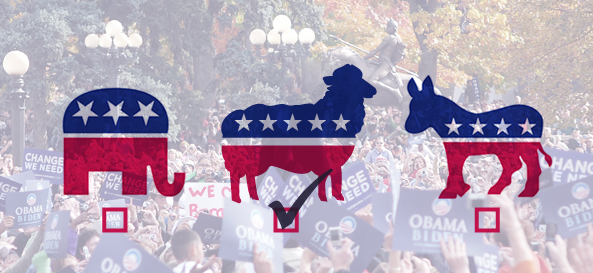
I recently dropped by a cocktail party in a snooty part of Washington D.C. where I was politically profiled.
After mingling with a few people, I got into a rather spirited talk with a half-drunk guy.
“I don’t ever associate with conservatives,” he said. “Matter of fact, I’d happily never talk to someone on the other side again.”
“Oh yeah? But how do you know I’m not conservative?” I asked.
He squinted for a moment, then half-punched my shoulder. “Nawww, you’re wearing skinny jeans and have a good five o’clock shadow. I know what you are.”
This guy decided in a matter of seconds whether we were buddies or archenemies based on how he believed my appearance reflected my political viewpoint. More importantly, he presumed I had a political affiliation (which I technically don’t) and that this affiliation revealed the most important part of my identity.
The conversation ended after a joke about The Whig party and something to do with flat-rate taxes (because that’s what people in D.C. joke about on Saturday nights). But more than anything, this talk revealed the sad truth and narrow-mindedness of heated division. Of course, we should not simply brush disagreements under the rug, but I see extreme, hate-filled polarization as a bigger issue than a tax break for the middle class or the size of the military budget.
In other words, I believe people have more value than issues.
This does not mean debates are insignificant. In fact, many of today’s hot issues directly involve people’s lives, but some serious hypocrisy occurs when you disregard the value of the person in front of you in order to regard the value of someone abroad.
So I have an idea. It’s incredibly simple yet horribly challenging.
Talk to people you know you disagree with. Have a conversation with a Muslim. Grab lunch with a fundamentalist Christian. Listen to the reasons they think and feel the way they do. Try to understand their viewpoint.
I’ll never forget the time I spoke with an atheist anarchist in Ukraine. After helping to teach an adult English class with some missionary friends, I sat down next to one student in his early twenties, hoping to strike up a casual conversation. He asked why I had come to Eastern Europe, and I explained that my love for God made me want to travel abroad to serve other people. He snickered and said, “I don’t believe in God, and I don’t see how anyone with intelligence could.”
Immediately, I felt the sharp divide. We disagreed on the issue I cherished most, and more than that, this guy directly insulted my intelligence and motivation for living. I wanted to do one of two things: either get up and walk away, or launch into a theological tirade combining the ontological argument with witty analogies to stomp this guy’s thinking into the ground.
As I took a deep breath to begin my overly zealous rant, something snapped. I realized my argument would only create more loveless division. I asked a question instead: “Why do you feel this way?”
My punk-rock friend then opened up about how he had seen a lot of abuse within the church and local government, and how he no longer trusted any kind of authority. I listened to his anger, empathized with his frustration and then shared how I had experienced many of those things and therefore trusted in the grace of God. The conversation had completely shifted toward one of mutual understanding.
Listening takes humility and patience and neither of those are very fun, but good communication has the ability to extinguish bitterness, hatred, hostility and anger.
I am always amazed by how Jesus spent most of His time with people outside of his social class. He dined with tax collectors, traveled with uneducated fisherman and became close friends with prostitutes. Most of these people would have completely contradicted His Jewish orthodox lifestyle, yet He valued their lives and wanted to get to know them deeply.
In this election season particularly, we naturally want to draw party lines and huddle together with our own team. But this takes no courage. The real challenge is stepping across the line to understand why others believe the way they do. Having done this a few times, I’m starting to see that the line is imaginary, and in reality, most of us simply support what we believe will make the world a better place.
I heard someone wise once say, “When we truly discover how to love our neighbor as our self, capitalism will not be possible and Marxism will not be necessary.” This may seem overly idealistic, yet giving genuine appreciation and respect to the person sitting next to you opens up a whole new range of opportunity.
So do something radical today and open your ears to those you normally shut out.






















